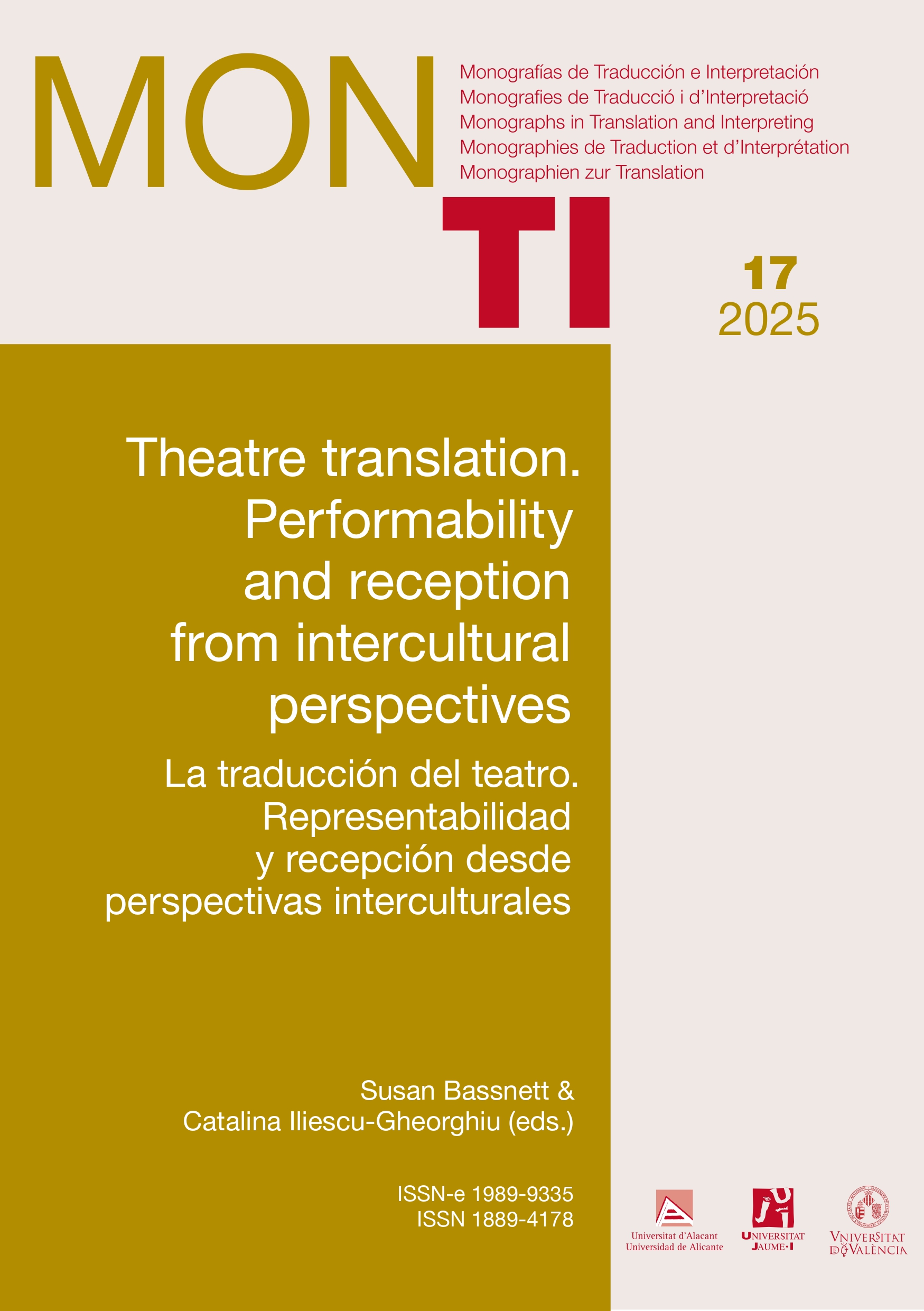Who’s afraid of Caryl Churchill’s Top Girls? Marietta Rialde and ‘feminist’ theatre in translation in 1980s Greece
Contenido principal del artículo
Resumen
Marietta Rialde, la “enfant terrible” del mundo del teatro griego (Steen 2015: 42), fue una directora de escena, actriz, dramaturga y traductora feminista. Rialde, una de las pocas mujeres en el panorama teatral griego dominado por los hombres de las décadas de 1960 y 1980, dirigió su propio Teatro Experimental, actuó ella misma, tradujo y escribió obras que abordan cuestiones de género y de mujeres. Cuando decidió dirigir y montar Top Girls (1983) de Caryl Churchill, en una traducción de Marlena Georgiadi, apareció en los titulares provocando un acalorado debate. El estudio muestra que tanto Rialde como Georgiadi vieron la traducción teatral como una praxis social, política y activista. En una primera exploración de los elementos paratextuales y de la recepción crítica de esta traducción y puesta en escena griega de Top Girls, este artículo tiene como objetivo discutir la contribución de la traducción teatral en Grecia para poner el feminismo en la agenda pública y generar conciencia en la búsqueda de la equidad en un panorama social cambiante.
Descargas
Detalles del artículo

Esta obra está bajo una licencia internacional Creative Commons Atribución 4.0.
La propiedad intelectual de los artículos pertenece a los autores y los derechos de edición y publicación, a la revista. Los artículos publicados en la revista podrán ser usados libremente para propósitos educativos y científicos, siempre y cuando se realice una correcta citación del mismo. Cualquier uso comercial queda expresamente penado por la ley.
Citas
Andreadis, Yangos. (1983). “From Soul to History. The Loneliness and Uprising of a (Successful?) Woman.” Exormisi, 31/12/1983.
Angelikopoulos, Vasilis. (1990) “Directing is a Male Profession.” To Vima tis Kyriakis, 13/05/1990.
Anonymous. (1983). “Successful Women.”, p. 13.
Apoulios. (1983) “A Feminist Performance. Caryl Churchill’s ‘Successful Women’ at the New Stage, National Theatre.” Mesimvrini, 28/12/1983.
Aston, Elaine. (1999) Feminist Theatre Practice. A Handbook. London: Routledge.
Aston, Elaine. (2003) Feminist Views on the English Stage. Women Playwrights, 1990-2000. Cambridge: Cambridge University Press.
Athenaios, Perseus. (1984a) “Successful Women.” Imerisia, 12/01/1984.
Athenaios, Perseus. (1984b) “Many Hints and Implications by the ‘Successful Women’ at the New Stage of the National Theatre.” Eleftheria tis Kyriakis, 29/01/1984.
Bassnett, Susan. (1991) “Translating for the Theatre: The Case against Performability.” TTR 4:1, pp. 99-111.
Betsko, Kathleen & Rachel Koenig (eds.) (1987) Interviews with Contemporary Women Playwrights. New York: Beech Tree Books.
Bigliazzi, Silvia; Peter Kofler & Paola Ambrosi. (2013) “Introduction.” In: Bigliazzi, Silvia; Peter Kofler & Paola Ambrosi (eds.) 2013. Theatre Translation in Performance. London: Routledge, pp. 1-27.
Bourdieu, Pierre. (1977) Outline of a Theory of Practice. Translated by Richard Nice. Cambridge: Cambridge University Press.
Campbell, Beatrix. (1987) Unofficial Secrets: Child Sexual Abuse: The Cleveland Case. London: Virago.
Chrysanthopoulos, Thanos. (2022) “Marietta Rialde’s Experimental Theatre (1963-1980): Ideology, Experimentation, Renewal.” Scene 14, pp. 47-69.
Fenek-Mikelides, Ninos. (1984) “The Cost of Success. ‘Successful Women’ at the National Theatre.” Eleftherotypia, 10/01/1984.
Georgiadi, Marlena. (1983) “The ‘Successful Women’.” Successful Women. Athens National Theatre programme, p. 15.
Georgousopoulos, Kostas. (1984) “Processes of Distinct Sadness.” Ta Nea, 4/01/1984.
Godayol Nogué, Pilar. (1998) “Interviewing Carol Maier: A Woman in Translation.” Quaderns. Revista de traducció 2, pp. 155-62.
Igglesi, Chrysi. (1990) Women’s Faces, Facets of Consciousness. Shaping Women’s Identity in Greek Society. Athens: Odysseus.
Johnston, David. (2013) “Professing Translation. The Acts-In-Between.” Target 25:3, pp. 365-384.
Kotsopoulos, Thanos. (1984) “‘Successful Women’ (at the New Stage of the National Theatre).” I Vradini, 10/01/1984.
Lignadis, Tasos. (1983) “Feminist Misunderstandings. ‘Successful Women’ at the National Theatre.” Kathimerini, 28/12/1983.
Luckhurst, Mary. (2015) Caryl Churchill. London & New York: Routledge.
Milling, Jane. (2012) Modern British Playwrighting. The 1980s. Voices, Documents, New Interpretations. London: Methuen Drama.
Misiou, Vasiliki & Loukia Kostopoulou (eds.) (2023) New Paths in Theatre Translation and Surtitling. London & New York: Routledge.
Nightingale, Benedict. (1982) “Women’s Playtime.” New Statesman, 10/09/1982, p. 27.
Nitsos, Kostas. (1998) Asterisks II. Athens: Kastaniotis.
Pagourelis, Vaios. (1983) “Almost ‘Successful Women’ at the New Stage, at the National Theatre.” Eleftheros Typos, 19/12/1983.
Patsalidis, Savas. (1996) “Greek Women Dramatists. The Road to Emancipation.” Journal of Modern Greek Studies 14:1, pp. 85-102.
Rialde, Marietta. (1974) “‘Sh..’ Panic Satire. Those Artists Who Are Not Committed Are Lost.” Anti 2:4, pp. 39-40.
Rialde, Marietta. (1983) “Note.” Successful Women, Programme, National Theatre, Athens, p. 6.
Rosi, Lina. (2020) “Tracing Women Itineraries in the Theatre of Metapolitefsi: Theory Pursuits and Research Questions.” In: History and Historiography of Modern Greek Theatre. Conference Proceedings in honour of Thodoros Hadjipantazis. Rethymno: Institute for Mediterranean Studies, pp. 344-364.
Sakellaridou, Elsi. (2012) Contemporary Women’s Theatre. From the Meta/Brechtian to Meta/Feminist Representation. Thessaloniki: Epikentro Publications.
Several authors (Allagi Patron). (1983a) “The First Woman Director Staged a Play at the National Theatre. A Feminist Play by Caryl Churchill.” Allagi Patron, 17/12/1983.
Several authors (Eleftherotypia). (1983b) “Women Have Conquered the New Stage. There’s No Man in Tomorrow’s Premiere.” Eleftherotypia, 15/12/1983.
Several authors (Estia). (1983c) “In a Few Words.” Estia, 16/12/1983.
Several authors (Ethnos). (1983d) “They Loved the ‘Successful Women’.” Ethnos, 15/12/1983.
Several authors (Exormisi). (1983e) “The Long Journey of Inequality.” Exormisi, 12/12/1983.
Several authors (Imerisia). (1983f) “‘Successful Women’ Starting Today at the New Stage of the National Theatre.” Imerisia, 16/12/1983.
Several authors (New York Times). (1983g) “Greece Approves Family Law Changes.” The New York Times, 25/01/1983. <https://www.nytimes.com/1983/01/26/world/around-the-world-greece-approves-family-law-changes.html>.
Simon, John. (1983) “Sex, Politics, and Other Play Things.” Vogue, August 1983, <https://archive.vogue.com/article/1983/8/1/sex-politics-and-other-play-things>.
Stamatopoulou, Elena. (2017) “Modern Greek Theatre in Postwar Years (1944-1967).” Thessaloniki: Aristotle University of Thessaloniki. Unpublished PhD Thesis.
Steen, Gonda van. (2015) State of Emergency. Theater and Public Performance under the Greek Military Dictatorship of 1967-1974. Oxford: Oxford University Press.
T. (1984) “Successful Women.” Estia, 9/01/1984.
Thatcher, Margaret. (1987) “TV Interview for BBC (eve of poll; “drool and drivel they care”).” Interviewed by David Dimbleby, 10/06/1987. Margaret Thatcher Foundation. <https://www.margaretthatcher.org/document/106649>.
Tusscher, Tessa Ten. (1986) “Feminist Perspectives on the New Right.” In: Evans, Judy; Karen Hunt; Elizabeth Meehan; Tessa Ten Tusscher; Ursula Vogue & Georgina Waylen (eds.) 1986. Feminism and Political Theory. London: Sage Publications.


